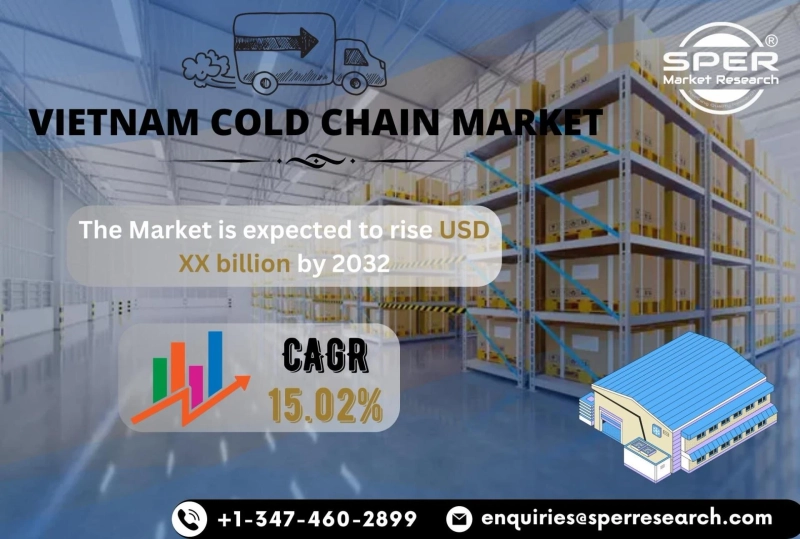The Cold Chain refers to the system of storing, transporting, and handling temperature-sensitive products, ensuring their freshness and safety. It includes cold storage facilities, refrigerated transportation, warehouses, and logistics. The cold chain is crucial for meeting quality standards and extends the shelf life of perishable goods. In Vietnam, it is essential due to increasing food exports, urbanization, and changing consumer preferences. The government, industry, and technology advancements drive the development of the Vietnam cold chain to meet market demands and ensure food safety.
According to SPER market research, ‘Vietnam Cold Chain Market Size- By End User, By Ownership - Regional Outlook, Competitive Strategies and Segment Forecast to 2032’ state that the Vietnam Cold Chain Market is predicted to reach USD XX billion by 2032 with a CAGR of 15.02%.
The Vietnam cold chain market is experiencing growth due to increasing export opportunities for agricultural and seafood products, which require a robust cold chain infrastructure to meet international quality standards. Urbanization and changing lifestyles have driven the demand for convenience foods, necessitating an efficient cold chain for frozen and chilled products. The Vietnamese government's initiatives and investments in promoting public-private partnerships, providing incentives, and improving regulations have encouraged investments in cold storage facilities and refrigerated transport. Technological advancements, such as temperature monitoring systems and improved refrigeration equipment, have enhanced operational efficiency and reduced wastage.
The Vietnam cold chain market faces challenges in technology adoption, limited awareness, fragmented supply chain, quality control, cost constraints, and limited expertise. The industry lacks advanced technologies and equipment, requiring investments in refrigeration systems and temperature monitoring devices. Limited knowledge leads to mishandling of temperature-sensitive products. The fragmented supply chain causes inefficiencies and delays. Maintaining consistent quality control and adherence to international standards is a challenge. High costs hinder the establishment and operation of cold chain facilities, especially for small and medium-sized enterprises. Additionally, there is a shortage of skilled professionals in logistics, storage, and temperature monitoring, affecting the efficient functioning of the cold chain.
Request For Free Sample Report @ https://www.sperresearch.com/report-store/vietnam-cold-chain-market.aspx?sample=1
The COVID-19 pandemic disrupted international trade, impacting the import and export of temperature-sensitive goods in Vietnam. Travel restrictions and logistical challenges affected the cold chain market, leading to delays, increased costs, and the need for additional safety measures. The pandemic also heightened consumer awareness of food safety and hygiene, prompting the cold chain industry to implement stricter protocols throughout the supply chain. Recognizing the importance of a robust cold chain infrastructure, the Vietnamese government invested in expanding and modernizing the market, particularly in rural areas, to support agricultural and seafood preservation and export capabilities.
Geographically, Ho Chi Minh City emerged as the dominant region in the Vietnam Cold Chain Market. As Vietnam's largest city and economic hub, HCMC is a significant player in the cold chain market. It has a well-developed infrastructure and logistics network, making it an ideal location for cold storage facilities, distribution centres, and transportation hubs. Furthermore, the project period anticipates a growth in the Vietnam cold chain market driven by factors such as growing demand for perishable goods, expanding food processing and retail sectors. Additionally, some of the market key players are Lineage, Emergent Cold Storage, Vinafco, Crane Worldwide Logistics, Hong Lai Group, Others.
For More Information, refer to below link:-
Vietnam Cold Chain Market Revenue
Related Reports:
Follow Us –
LinkedIn | Instagram | Facebook | Twitter
Contact Us:
Sara Lopes, Business Consultant – U.S.A.
SPER Market Research
+1-347-460-2899


